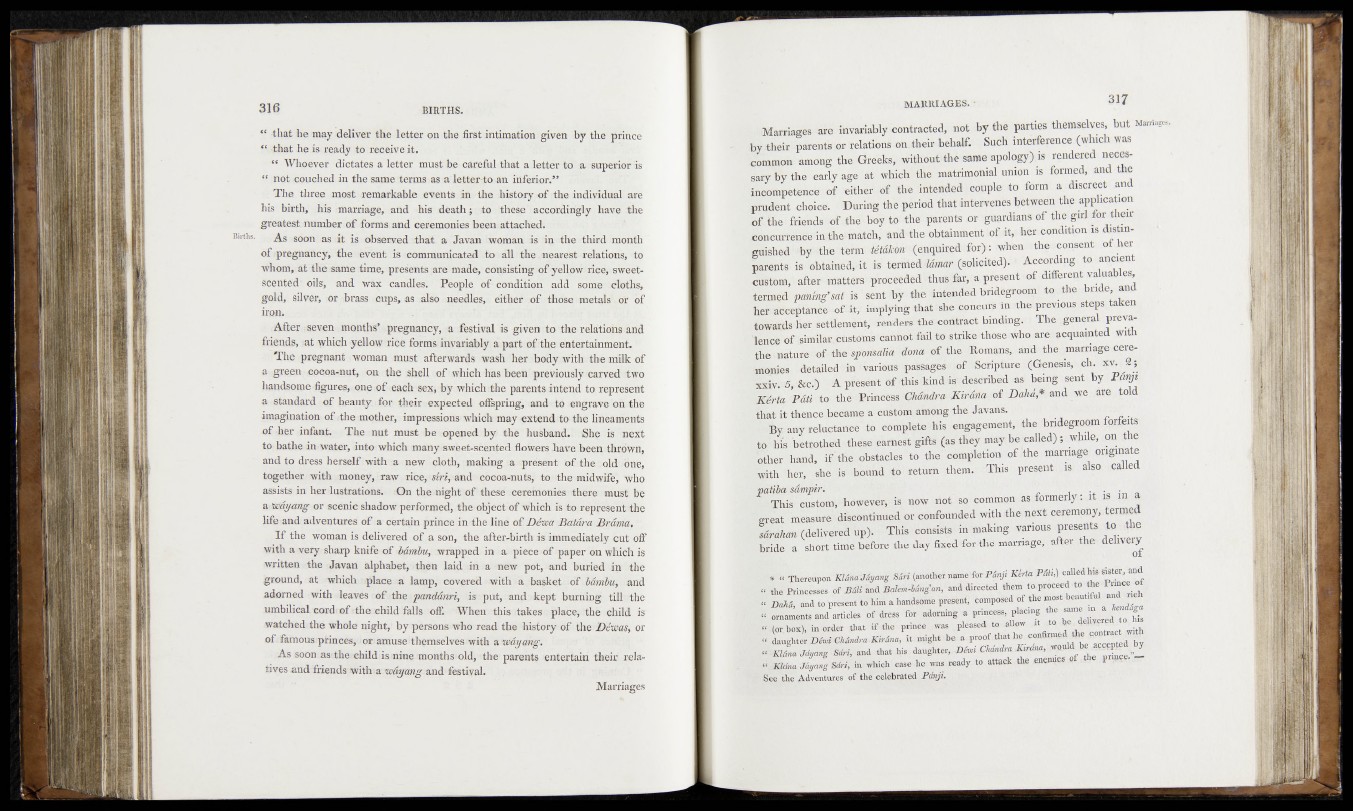
“ -that he may deliver the letter on the first intimation given by the'^iânce
“ that he is reacly-to receive it.
“ Whoever dictates' a letter must he careful that a letter to a superior is
“ not touched in the same terms as a letter-toan inferior.”
The three most remarkable events in the history of the individual are
his birth, his marriage, and his death ; to these accordingly have the
greatest number of forms, and ceremonies been attached.
As soon as i t is observed that a Javan woman is in the third month
of /pregnancy, the /event is communicated to all the .nearest ^relations; to
wham, at the same time, presents are made, consisting of yellow rice, sweet-
Scented* oils, and wax candles. ’People o f condition add some cloths,
gold, silver, or (brass eups, as .also needles, either .of 'those metals’. qf
iron.
After fseven months’ pregnancy, a .festival is given to the relations.and
friends, tat which yeMow rich forms invariably a part of'the entertainment.
• The pregnant woman must afterwards wash 'her ’ hody with , the milk of
a green cocoa-nut, on the shell of which has been-previously carved two
handsome figures, «one o f each sex, fey which /the parentsintend' tçr represent
a standard of beauty for their expected offspring, and to engrave onsthe
imagination of /the mother, impressions which may-extend /to the lineaments
of her infant. The nut must be opened by the husband. ?1 *Shp. is next
to- bathe in • water, into • which many .sweet-scented flowers have feeenitlitown,
and to dress herselfiwith -a new doth, making-a (présent bf'th&saldóSnë,
together with money, raw rice, rfrvand cocoa-nuts, tonthe-rnidwife“, Who
assists in her lustrations. :Qn thenight of these .'ceremonies there must! fee
mwtfywg or (seenie shadow performed, thejohject of which is to representtthc
life-and adventures of a certain prince in -the line oîD&maPiatâra Bwâma.
I f the woman is delivered of a son, the after-birth is immediately cut off
•with a-very-sharp knifeof >Mmbu, wrapped in -a piecernf fpaper on whiëh is
■written the Javan alphabet, .then laid in a new pot, and buried -..ip-fethfe
ground, at rwhiçh place .à lamp, covered with >a 'basket .étiM nA ti tand
adorned -with .leaves cofiÛtepamMnn, is * put, /and,kept burning tUl"7the
umbiHeal cordiof ;the/cbüd fails off. When /takes place, the child is
■watched the whole night,' by persons who read the history öf theJDewas, or
of.fomoussprincesjuorJiffluseithemselvesiwith a vvâyang.
As soon asrthe.childfs'nioe months-old, ‘the parents entertain their relatives
and friends with a rwayang and- festival.
Marriages
Marriages are invariably-contracted, not fey the parties themselves, but p H
fey-their parents W e laW s - b nW r behalf. . Such, interference (which was
common among the flecks, without'.the same apology).is rendered necessary
bV the early age . at- 'which'4e matrimonial union is formed, and the
incompetence of either of the intended couple, to fo rai a discreet and
prudent choice; ' (During thfepéribd that intervenes between the application
o f the ftteildk^rif the^feoy tp the parents (0r guardians* óf the girl for their
boncurfenceinrfie'matóh, -andrflie .obtainment nfi^t^lier .condition is distinguished
Aby'rftbfe term fc'tó&ön^enquiredrfor),1: whfen- the -consent o her
parents is -obtained',-it is1- teréâèd >lâmar (solicited). » According to appien
custom, after matters ^oceeded-thusrfar, a,present .of -different valuables,
terined pcmmg’saÆ , sent 'by the .'intended bridegroom i to the bride ana
fee^'aóceptanóe^oÊ it, implying that Cshe 'cpncars in vthc previous steps taken
towards her fetïem'çnt, -renders-the-contract binding-.-, i m i n e r a l prevalence
of similar.cüstó'mfe'cannot fail to strike «those -who ,-are acquainted with
the mature ■ ofthe^pem dlia dona ofîtbe -Romans, and- ..the' marriage .ceremonies
detailed ' -in varions parages of Scripture (©pnesis,. ch. xv. 2-;
xxiv.^5,'-&c;i) A present df-this'kind^V;d,ésGribed as being sent by Panjt
m rta PM to the 'Princess -Chandra Doha,* and we--are .told
that iti thence-became a custom, among the Javans. R f 1 HR
, .By. any reluctance .to cèmplete?feis engagement, the bridegroom forfeits
to his -betrothed -these earnest gifts (as tfeèy may'.feefcalled) ; while, pn the
& e r hand, if the obstacles ' tfe, th |f completion of/the marriage originate
with 'her, Jie dsf-bound -to return them.- This present ;is- algo .called
naûbasâmpirI - - -
This custom,'W e v e r,-is now riot «p-fcomnwn .as;,formerly : it is m a
great measure'discontinued or confoundedggg| hext ceremony,,termed
««Snrta (delivered up). B H U H E H I
bride a short time b ,M .th e day fixedftr-the marnege, after the dehv«y
* « Thereupon Klâna'Jâyang S&ri (another name'for-P^ji Kiria Pâti,) called hw g ^ | | |
« the Princesses of Bâti and B H « and-directed them proceed -to the | | | É g
I M and to present to'him a handsome present,1
« ornaments and articles Ogress for adorning-a princess, placing , f ;
H ÿ Ê M m if the prince was pleased to allow rt ^ M ^ e d to, his
êó' daughter DêtuiG'hândra Kirâna, it might be
1 Klâna Jdyang Sdri, and that his daughter, Jlfci
"JKMna Jâyang Sdri, in which ease-he was.ready to a tta ck s g | -®r^ e*
See the Adventures of the celebrated PdnjL